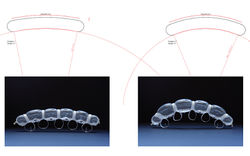project C:Inflatables
| Line 27: | Line 27: | ||
| − | [[Project C:Home#STRUCTURE_2|Back to Structure]] | + | [[Project C:Home#STRUCTURE_2|Back to Structure >>]] |
Revision as of 15:42, 22 November 2011
The principle behind the inflatable units is the stiffness created by the increasing of the inside pressure. By pumping more air into the units, the spine that contains the balloon will fold, becoming more stiff and enhancing the rigidity of the unit. From a geometrical point of view, by increasing the pressure/air, the distance between the ribs of the spine increases and the diameter of the balloon's sections increases. Combining two inflatable units with one spine makes it possible to curve in two directions.
The use of inflatable units assures the system to be very light and to profit of the
possibility of using the lowest amount of materials possible. Furthermore the
presence of “air-chambers” as gigantic bricks give to the structure good values in
terms of (acoustic) insulation.
The different positions of the inflatable’s unit and their different transparencies create a porosity that helps the structure to mimesis with the surroundings and to profit of the natural light.
Credits for this research / project go to:
Students: Yaron Israel (Israel), Alice Mela (Italy) and Lieke Kraan (Netherlands)
Tutor: Marco Verde. Hyperbody MSc1, faculty of Architecture, TU Delft
